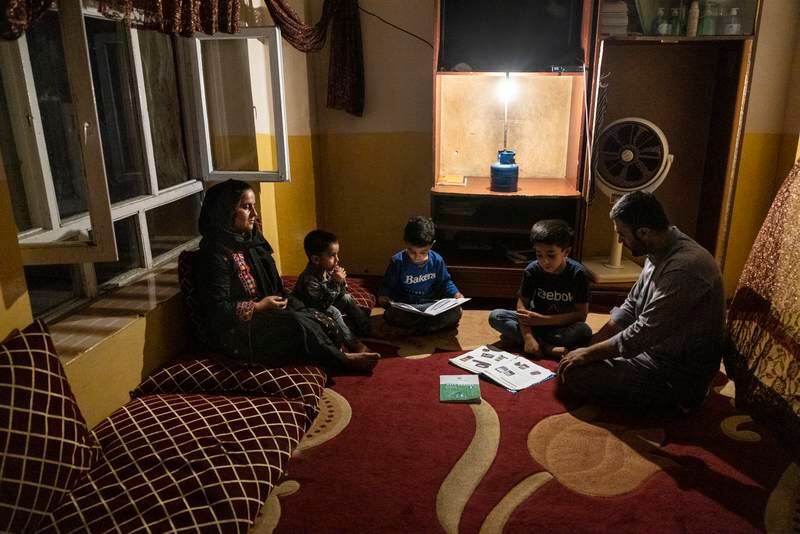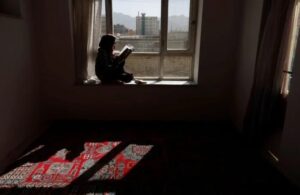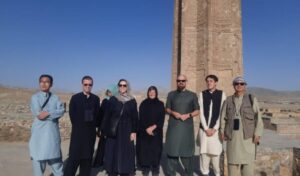KABUL (SW) – Salam Watandar has interviewed 30 girls in various provinces of Afghanistan about the families’ behavior. Most of these girls have shared experiences of being treated differently within their families, expressing concerns about unequal attention compared to their male counterparts.
Out of the 30 girls interviewed, 22 said that they have experienced gender discrimination at home, highlighting its adverse impact on their mental well-being.
Somaya, a 22-year-old resident of Kabul city, talks about her experience of being treated unfairly and duplicitously by her family due to societal traditions and false beliefs. According to her, the unequal importance given to women compared to men has had a detrimental impact on her mental well-being, leading to the development of mental health issues.
She adds: “I have faced gender discrimination. There is not given the right to work, and should not even say anything about the right; because you are a girl and should not talk anywhere. My brother is illiterate, and I have faced gender discrimination from him, and this has negatively affected me mentally. Discrimination in the family is harmful and hard, it makes a person disappointed and heartbroken. They are afraid that if women study, they will surpass them.”
Marwa, another resident of Kabul, who has also faced being differently treated by her family and has lost many chances and progress in her life, says that Islam has given special rights to girls, but due to false beliefs and traditions and the low level of literacy among the families, girls are deprived of all their rights.
“There is gender discrimination in our family. They think that boys are their future makers and will protect them. Our brothers have the right to study and work, and can be outside the house until late, but we do not have this right. The right to study and work has been taken away from us. Boys can achieve their dreams, but we are not allowed to choose our favorite field and university”, She added.
Khaleda and Mina, the main residents of Maidan Wardak who now live in Kabul city, tell Salam Watandar that the elders of their families have not paid as much attention to them as the sons of the family, which has caused them to suffer from mental illness, adding that the neglect of the family has made them feel alienated in their family.
Khaleda says: “The discrimination I have faced exists in every family and girls have faced it as well. Girls are not given the love and respect. Compared to girls, more money is spent on boys because they say that these are our capital. In every house where a girl is born, they are more upset, but if a boy is born, everyone is happy and celebrates. Girls are not valued in our society. Because of my family’s neglect, I feel like an alien.”
Mina also says: “There is discrimination in our society and family, especially that we are responsible for all the housework and the boys do nothing at all, and working at home is considered a shame for them; therefore, they do not get a share in it. In terms of education, finances and emotion, we have also faced discrimination, but more attention is paid to boys. We have not been given the right to marry, and we have not even been given the right to speak about an issue.”
In Afghanistan, wrong customs and traditions, misinterpretations, discrimination among children in families, illiteracy, and economic challenges are significant factors affecting women the most.
Setara Ahmadi, one of the 30 girls that Salam Watandar interviewed, says that she has one brother and six sisters, and her parents pay more attention to her brother than them.
Setara says: “We face discrimination in all parts of life such as the right of learning education, financial and emotional rights. My family pays a lot of attention to my brother, and mostly my mother discriminates between us. She tells us to appreciate our brother and respect him.”
Shabnam also complains about the discrimination between boys and girls in her family. According to her, “a girl belongs to the people and a boy is the wealth of the family.”
“In most families, girls are not given the right, and they are not allowed to speak. I have also faced this discrimination, and it has hurt me mentally and emotionally. Most of families say that sons are the honor and everything they have is from him, and a daughter belongs to the people. They say that the son is called by the name of the family. We cannot even have our choice, and do not have the right to learn education,” said Shabnam.
Fereshta, another girl who was interviewed, also says: “In general, the right to study and work has been taken away from girls, and we are facing educational discrimination, and the current situation has caused us to be deprived of the right to study.”

Despite different perspectives, some families say that prevalent beliefs and customs in the country dictate that girls should primarily engage in household chores and stay at home. Ahmad Khan, who has two brothers and three sisters, believes that a girl’s role is within the home, responsible for domestic duties, while work outside should be solely undertaken by men.
He adds: “Most of the housework is done by our sisters, and my brothers study and go to school. There should be a difference between them, and work with their mothers at home. They stay with us for a short time, they learn housework. No matter how much we spend on our brothers, they will stay with us until the end, and girls go to the peoples’ house. My brothers are dear to me because they stay by our side and help us in every difficulty and problem.”
On the other hand, a number of women’s rights activists say that traditions, backwardness and tribal life in the Afghan society have caused the rights of girls to always be covered.
Hussain Raofi, one of the women’s rights activist, says that gender discrimination has a negative impact and hinder the progress of society.
He adds: “Today, we see the boys’ graduate ceremonies, but the girls are deprived of it, and this causes a negative impact on the girls. If this section of the society is paralyzed and pushed back, then our society will be destroyed. Gender discrimination starts from families. When there is no discrimination in a family, this problem will be solved and it should be eliminated in families.”
Hebatullah Ibrahimkhel, one of the psychologists, says that there are different types of gender discrimination between boys and girls and it causes mental and emotional illnesses among girls.
He adds: “Unfortunately, in our society, there is a lot of gender discrimination between boys and girls, and it has different types; usually boys are given a lot of value. Most of the girls and patients who come to us are facing gender discrimination, because they are not treated emotionally at home, they have not seen the love of the family. My advice to the families is to consider their children equally and see their needs, respect and give love to both so that gender discrimination disappears.”
Meanwhile, religious scholars say that in Islam, there is no difference between boys and girls in terms of morals and human values, and in their point of view, it is a bad thing to differentiate between children.
Qutbuddin Mujtahid, a religious scholar, says: “Islam is a religion of justice and love, and children are God’s greatest blessing. Families are obliged to provide them the facilities of life. In Islam, there is no difference between boys and girls, but there is a difference in terms of morals and human values. The reason for sexualism is that people think boys are good for them, always protecting them and being strong; therefore, more value is given to them. From the point of view of Islam, this is wrong and bad, they should be given the rights given by God, and the families should show love to both of them.”
However, officials in the Islamic Emirate’s Ministry of Good and Prohibition of Evil say that they have tried to prevent gender discrimination and any other illegal behavior among family members in the country.
Mujiburahman Siddiqi, the head of the media department of this ministry, told Salaam Watandar that many women who were not given the right to inherit have now received their rights with the support of them.
“Discrimination is an illegal act in Islam, and the Ministry of Public Affairs has asked its ombudsmen in 34 provinces to fight against discrimination. Also, this act is an illegitimate act in Islam, if a girl is born in a family and the families are sad, this act is not a good act from the point of view of Islam and is an illegitimate act. Frequent seminars have been held by leaders in the center and provinces and people have been informed and no one is allowed to discriminate. This ministry has always tried to prevent discrimination and has fought against it,” Siddiqi added.
It should be mentioned that in the remote areas of the country, underage marriages, abuse of girls, beatings and deprivation of their social rights are among the problems faced by Afghan women.
ENDS






